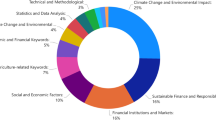Abstract
In June 2003 leading investment banks announced the adoption of the Equator Principles, a voluntary set of guidelines developed by the banks for managing social and environmental issues related to the financing of infrastructure projects. Andreas Missbach discusses the Equator Principles comparing them with a broader NGO-vision on sustainable finance (The Collevecchio Declaration). He shows that there are ways of implementing the Principles in order to make a difference.
Similar content being viewed by others
Notes
In a draft version, the Principles were labelled ‘Greenwhich Principles’, the name was changed, when the banks realized that it could easily changed into ‘Greenwash Principles’.
Banks that have adopted the Equator Principles: ABN AMRO Bank, N.V., Bank of America, Barclays plc, CIBC, Citigroup Inc., Credit Lyonnais, Credit Suisse Group, Dexia Group, Dresdner Bank, HSBC Group, HVB Group, ING Group, KBC, MCC, Mizuho Corporate Bank, Rabobank Group, Royal Bank of Canada, Standard Chartered Bank, The Royal Bank of ScotlandWestLB AG, Westpac Banking Corporation.
Compliance Advisor Ombudsman, A Review of IFC's Safeguard Policies, Core Business: Achieving Consistent and Excellent Environmental and Social Outcomes, January 2003.
For a detailed NGO-analysis of how this project violates the Equator Principles, see http://www.baku.org.uk/publications/Equator_Principles.pdf.
IFC's safeguard policies are currently under revision. NGOs fear negative lobbying of the equator banks in this process as well.
Since then, the group has strengthened its cooperation. Since the beginning of 2004, the network is active under the name of BankTrack, www.banktrack.org.
After an intensive campaign by RAN (Rainforest Action Network) Citigroup developed internal policies that include sectoral standards and cathecorical exclusions ‘no-go zones’. http://www.ran.org/ran_campaigns/global_finance/citi_victory_policy.html
Efforts by corporations to be perceived as part of the world humanitarian community through voluntary association with the United Nations, without provisions for accountability.
For the complete position paper, see: http://www.banktrack.org/fileadmin/user_upload/documents/0_BT_own_publications/No_U_turn_allowed.pdf
Rights and permissions
About this article
Cite this article
Missbach, A. The Equator Principles: Drawing the line for socially responsible banks? An interim review from an NGO perspective. Development 47, 78–84 (2004). https://doi.org/10.1057/palgrave.development.1100069
Published:
Issue Date:
DOI: https://doi.org/10.1057/palgrave.development.1100069




